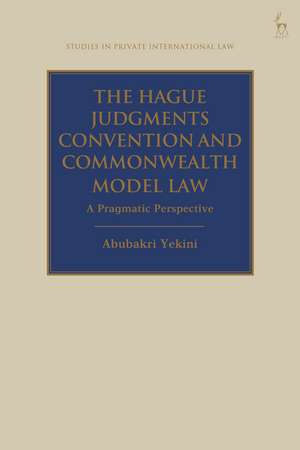The Hague Judgments Convention and Commonwealth Model Law: A Pragmatic Perspective: Studies in Private International Law
Autor Dr Abubakri Yekinien Limba Engleză Paperback – 22 feb 2023
| Toate formatele și edițiile | Preț | Express |
|---|---|---|
| Paperback (1) | 272.14 lei 43-57 zile | +98.73 lei 5-11 zile |
| Bloomsbury Publishing – 22 feb 2023 | 272.14 lei 43-57 zile | +98.73 lei 5-11 zile |
| Hardback (1) | 512.37 lei 43-57 zile | |
| Bloomsbury Publishing – 11 aug 2021 | 512.37 lei 43-57 zile |
Din seria Studies in Private International Law
- 17%
 Preț: 303.92 lei
Preț: 303.92 lei - 18%
 Preț: 306.65 lei
Preț: 306.65 lei - 27%
 Preț: 379.56 lei
Preț: 379.56 lei - 22%
 Preț: 264.57 lei
Preț: 264.57 lei - 18%
 Preț: 356.99 lei
Preț: 356.99 lei - 17%
 Preț: 260.07 lei
Preț: 260.07 lei - 18%
 Preț: 322.05 lei
Preț: 322.05 lei - 30%
 Preț: 569.87 lei
Preț: 569.87 lei - 30%
 Preț: 776.59 lei
Preț: 776.59 lei - 11%
 Preț: 344.86 lei
Preț: 344.86 lei - 30%
 Preț: 792.16 lei
Preț: 792.16 lei - 30%
 Preț: 510.75 lei
Preț: 510.75 lei - 24%
 Preț: 183.61 lei
Preț: 183.61 lei - 40%
 Preț: 728.64 lei
Preț: 728.64 lei - 30%
 Preț: 567.99 lei
Preț: 567.99 lei - 30%
 Preț: 572.73 lei
Preț: 572.73 lei - 14%
 Preț: 725.13 lei
Preț: 725.13 lei - 22%
 Preț: 201.34 lei
Preț: 201.34 lei - 30%
 Preț: 842.04 lei
Preț: 842.04 lei - 27%
 Preț: 381.09 lei
Preț: 381.09 lei - 17%
 Preț: 367.13 lei
Preț: 367.13 lei - 18%
 Preț: 359.54 lei
Preț: 359.54 lei - 30%
 Preț: 570.60 lei
Preț: 570.60 lei - 30%
 Preț: 578.19 lei
Preț: 578.19 lei - 30%
 Preț: 543.25 lei
Preț: 543.25 lei - 30%
 Preț: 1781.78 lei
Preț: 1781.78 lei - 18%
 Preț: 321.78 lei
Preț: 321.78 lei - 30%
 Preț: 572.06 lei
Preț: 572.06 lei - 30%
 Preț: 570.43 lei
Preț: 570.43 lei - 18%
 Preț: 312.40 lei
Preț: 312.40 lei - 30%
 Preț: 536.97 lei
Preț: 536.97 lei - 30%
 Preț: 540.07 lei
Preț: 540.07 lei - 30%
 Preț: 721.14 lei
Preț: 721.14 lei - 22%
 Preț: 240.04 lei
Preț: 240.04 lei - 30%
 Preț: 511.64 lei
Preț: 511.64 lei - 30%
 Preț: 1201.00 lei
Preț: 1201.00 lei
Preț: 272.14 lei
Preț vechi: 348.89 lei
-22% Nou
Puncte Express: 408
Preț estimativ în valută:
52.09€ • 56.60$ • 43.78£
52.09€ • 56.60$ • 43.78£
Carte tipărită la comandă
Livrare economică 21 aprilie-05 mai
Livrare express 14-20 martie pentru 108.72 lei
Preluare comenzi: 021 569.72.76
Specificații
ISBN-13: 9781509947119
ISBN-10: 1509947116
Pagini: 310
Dimensiuni: 156 x 234 x 25 mm
Greutate: 0.44 kg
Editura: Bloomsbury Publishing
Colecția Hart Publishing
Seria Studies in Private International Law
Locul publicării:London, United Kingdom
ISBN-10: 1509947116
Pagini: 310
Dimensiuni: 156 x 234 x 25 mm
Greutate: 0.44 kg
Editura: Bloomsbury Publishing
Colecția Hart Publishing
Seria Studies in Private International Law
Locul publicării:London, United Kingdom
Caracteristici
Offers both a practical and theoretical perspective to critique current recognition of judgments' framework
Notă biografică
Abubakri Yekini is lecturer in law at Lagos State University, Nigeria.
Cuprins
1. General Introduction I. Background of Study II. Research Problem III. Research Questions IV. Methodology V. Significance of the Study VI. Literature Review VII. Conceptual Clarification VIII. Structure of the Book PART ITHEORETICAL FRAMEWORKS FOR JUDGMENTS RECOGNITION AND ENFORCEMENT2. Recognition and Enforcement of Foreign Judgments: Theoretical Background I. Introduction II. Theoretical Bases for Enforcement of Foreign Judgments III. Conclusion 3. A Pragmatic Model for Recognition and Enforcement of Foreign Judgments I. Introduction II. Pragmatism as a Philosophical Thought III. Pragmatism as a Legal Theory IV. Legal Pragmatism Today V. Legal Pragmatism in Private International Law VI. A Pragmatic Approach to Recognition and Enforcement of Foreign Judgments VII. Conclusion PART IICOMMONWEALTH MODEL LAW ON THE RECOGNITION AND ENFORCEMENT OF FOREIGN JUDGMENTS4. Foreign Judgments Enforcement in the Commonwealth I. Introduction II. The Commonwealth III. Civil Justice and Cooperation in the Commonwealth IV. The 1920 and 1933 Statutory Schemes V. Conclusion 5. Commonwealth Model Law I. Introduction II. Preliminaries III. Excluded Matters IV. International Jurisdiction V. Recognition, Enforcement and Defences VI. Other Sundry Matters VII. Conclusion PART IIIHAGUE CONVENTIONS6. The Hague Judgments Project: Pre-2019 Attempts I. Introduction II. International Harmonisation of Foreign Judgments Laws III. HCPIL: History of the Hague Judgments Project IV. HCCA V. Conclusion 7. 2019 Hague Judgments Convention I. Introduction II. Pragmatism in the Negotiation of the Convention III. Scope and Exclusions IV. International Jurisdiction V. Refusal of Recognition VI. Other Sundry Matters VII. Has the Convention Met the Practical Needs of Litigants? VIII. Conclusion 8. Summary of Findings and ConclusionI. Summary II. Conclusion III. Contributions to Knowledge and Avenues for Further Research
